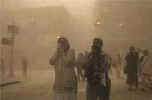As I write this on Thursday evening, the TV anchors are
still at their desks, trying to put a comprehensible face on
the events of September 11 and their aftermath. Over the
past three days, their voices have risen in pitch and tempo:
what was once measured and calming has become edgy and
overwrought. They record the almost instantaneous appearance
of American flags across the nation – 25,000 flags sold on
Wednesday, 27,000 today. Their cameras move in for close-ups
of tear-stained faces, as bereft friends and relatives
relate their loss. Again, and again, making the horrifying
familiar.
I fear that this very real disaster is being transformed
into reality television.
I fear that we are all being coopted into an unreal
drama.
And I choose my own words very carefully, knowing that
even in happier times, truth is a slippery beast.
<>
<> <>
Like most Americans, I experienced the attacks on the
World Trade Center and the Pentagon through the medium —
the lens, if you will — of television. And like most
Americans, I tend to interpret the attacks through the lens
of the past — or more specifically, through the lens of
film or literature encountered in the past. I tend to
express my responses in the rhetoric that frames this lens.
But in my case, it’s not Pearl Harbor that forms the
overarching metaphor. Nor is it the Crusades, a Holy War
pitting Christians against Muslims.
It’s the doomsday novels that reigned on the bestseller
lists of the late 1950s and early 1960s — Earth Abides,
Dr. Strangelove, On the Beach, When the Kissing Had to Stop,
Fail-Safe. The causes of destruction differed from book to
book, reading like the list of plagues at a seder:
pestilence, nuclear accident, left-wing takeover, nuclear
conflict. But the result was the same: the end of the world
as we know it. And they all expressed the fear that lay
beneath Cold War consciousness.
In the next decades, we learned to love the bomb. Then
the Cold War ended. But not the fear.
As I watched the World Trade Center collapse in eternal
replays and heard the rhetoric of retribution ring through
the halls of Congress, I recalled yet another novel from
that terrifying period, Pat Frank’s Alas, Babylon. It’s
a book that I’ve often thought of during the intervening
years, simply because the catalyst for the nuclear war that
forms its backdrop is “a new crisis in the Middle East”
(“new,” in 1959). In it, each military confrontation
slips easily into another, more intense one, until a voice
on the emergency broadcast network announces, “Fellow
countrymen. As all of you know by now, at dawn this morning
this country, and our allies in the free world, were
attacked without warning with thermonuclear and atomic
weapons…. Our reprisal was swift.”
That’s only the middle of the book. At the very end,
one of the survivors says, “There’s one thing more. Who
won the war?”
His companion puts his hands on his hips. “You’re
kidding! You mean you really don’t know?”
“No. I don’t know. Nobody knows. Nobody’s told us.”
“We won it. We really clobbered ’em!… Not that it
matters.”
<>
<> <>
Even in happier times, truth is a slippery beast. In
times of crisis, wordmongers set it spinning so that it’s
almost impossible to grasp. It’s far easier to cling to
simplistic formulas — they hold still.
When we hang onto these old rag dolls, we hold still as
well. When we bury our faces deeply in their folds — in
their dresses of American exceptionalism or capitalist
purity, we can’t move. Or to see anything else.
And so the crisis repeats itself. Again, and again. Until
the whole world goes up in flames, as in one of those Cold
War doomsday books.
It’s very difficult to discover new solutions to old
problems if we don’t look the old problems directly in the
face. If all we see is the somber visages of Dan Rather or
Peter Jennings, endlessly interviewing the same talking
heads.
It’s time to discard the rag dolls and look hard at
what’s in front of us. To find some new voices to displace
the old noisy ones that have been filling our heads from the
mainstream media. In this issue, the Call offers a number of
alternative takes on the present situation. There are of
course many more out there. But perhaps this sampling will
serve as a beginning.
<>
<> <>
 Oh
yes — the title of the book Alas, Babylon.
Oh
yes — the title of the book Alas, Babylon.
It’s from the Book of Revelation, as presented by the
King James Bible: Alas, alas, that great city Babylon, that
mighty city! for in one hour is thy judgment come.
Requiescant in pacem.
Betsey Culp